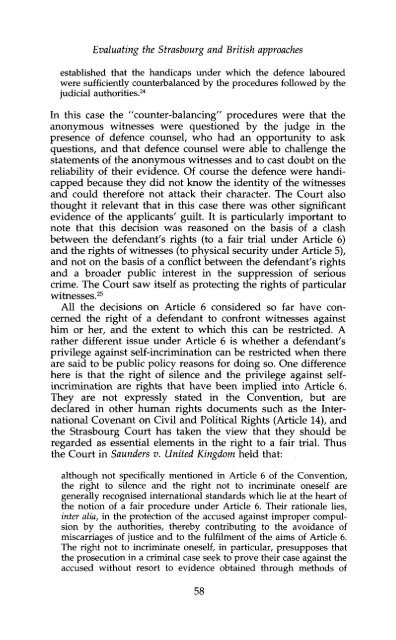Human Rights, Serious Crime and Criminal Procedure - College of ...
Human Rights, Serious Crime and Criminal Procedure - College of ...
Human Rights, Serious Crime and Criminal Procedure - College of ...
- No tags were found...
You also want an ePaper? Increase the reach of your titles
YUMPU automatically turns print PDFs into web optimized ePapers that Google loves.
Evaluating the Strasbourg <strong>and</strong> British approachesestablished that the h<strong>and</strong>icaps under which the defence labouredwere sufficiently counterbalanced by the procedures followed by thejudicial authorities. 24In this case the "counter-balancing" procedures were that theanonymous witnesses were questioned by the judge in thepresence <strong>of</strong> defence counsel, who had an opportunity to askquestions, <strong>and</strong> that defence counsel were able to challenge thestatements <strong>of</strong> the anonymous witnesses <strong>and</strong> to cast doubt on thereliability <strong>of</strong> their evidence. Of course the defence were h<strong>and</strong>icappedbecause they did not know the identity <strong>of</strong> the witnesses<strong>and</strong> could therefore not attack their character. The Court alsothought it relevant that in this case there was other significantevidence <strong>of</strong> the applicants' guilt. It is particularly important tonote that this decision was reasoned on the basis <strong>of</strong> a clashbetween the defendant's rights (to a fair trial under Article 6)<strong>and</strong> the rights <strong>of</strong> witnesses (to physical security under Article 5),<strong>and</strong> not on the basis <strong>of</strong> a conflict between the defendant's rights<strong>and</strong> a broader public interest in the suppression <strong>of</strong> seriouscrime. The Court saw itself as protecting the rights <strong>of</strong> particularwitnesses. 25All the decisions on Article 6 considered so far have concernedthe right <strong>of</strong> a defendant to confront witnesses againsthim or her, <strong>and</strong> the extent to which this can be restricted. Arather different issue under Article 6 is whether a defendant'sprivilege against self-incrimination can be restricted when thereare said to be public policy reasons for doing so. One differencehere is that the right <strong>of</strong> silence <strong>and</strong> the privilege against selfincriminationare rights that have been implied into Article 6.They are not expressly stated in the Convention, but aredeclared in other human rights documents such as the InternationalCovenant on Civil <strong>and</strong> Political <strong>Rights</strong> (Article 14), <strong>and</strong>the Strasbourg Court has taken the view that they should beregarded as essential elements in the right to a fair trial. Thusthe Court in Saunders v. United Kingdom held that:although not specifically mentioned in Article 6 <strong>of</strong> the Convention,the right to silence <strong>and</strong> the right not to incriminate oneself aregenerally recognised international st<strong>and</strong>ards which lie at the heart <strong>of</strong>the notion <strong>of</strong> a fair procedure under Article 6. Their rationale lies,inter alia, in the protection <strong>of</strong> the accused against improper compulsionby the authorities, thereby contributing to the avoidance <strong>of</strong>miscarriages <strong>of</strong> justice <strong>and</strong> to the fulfilment <strong>of</strong> the aims <strong>of</strong> Article 6.The right not to incriminate oneself, in particular, presupposes thatthe prosecution in a criminal case seek to prove their case against theaccused without resort to evidence obtained through methods <strong>of</strong>58
















